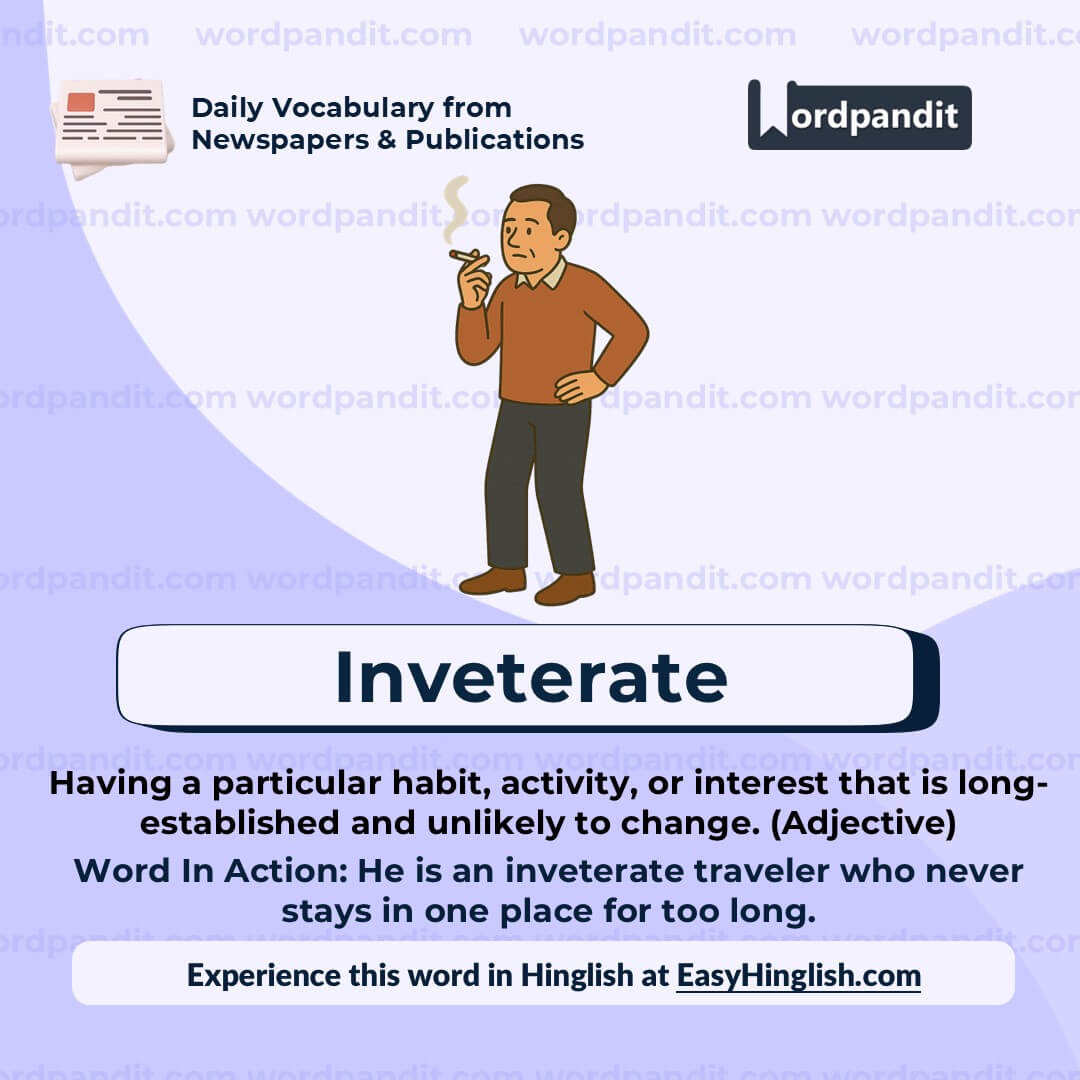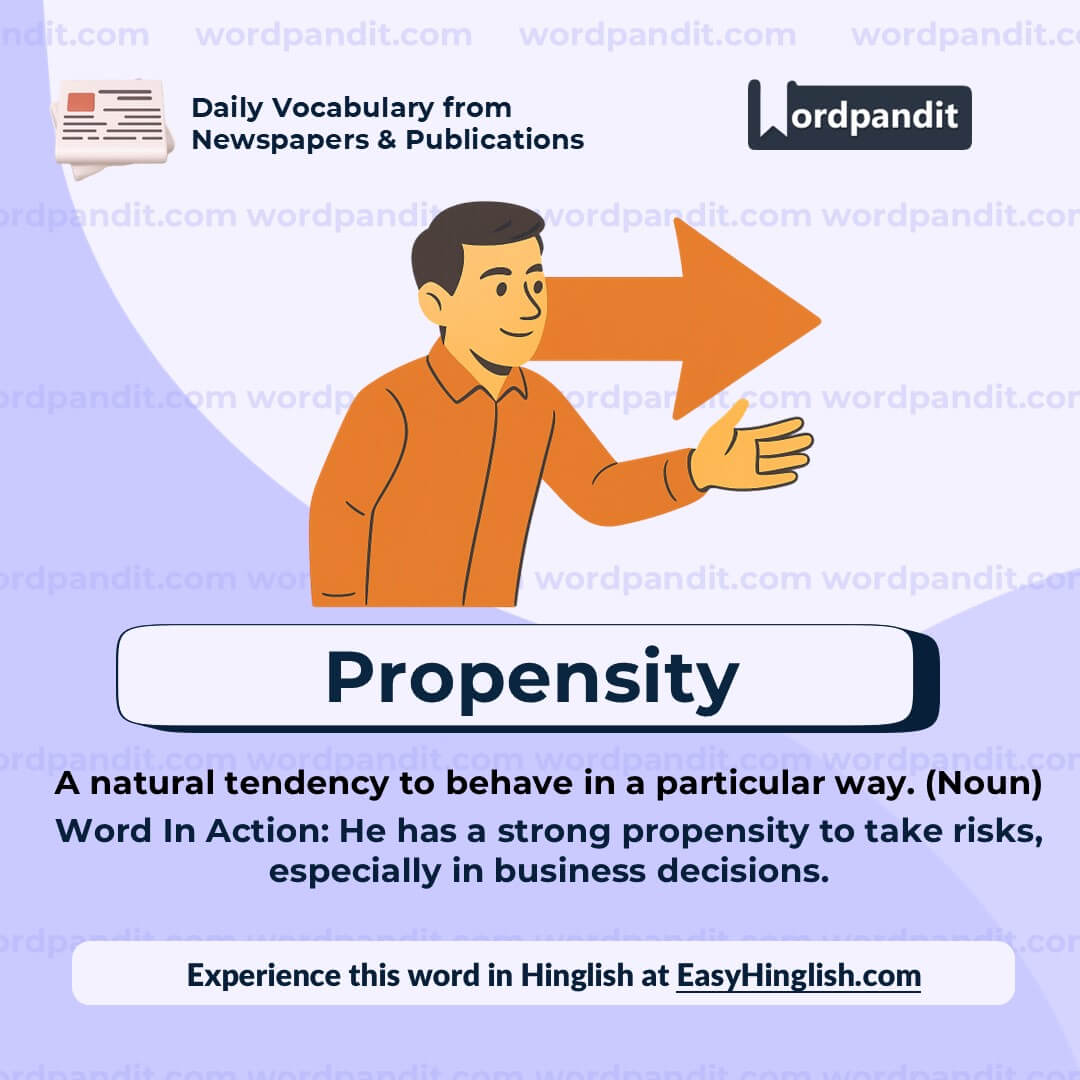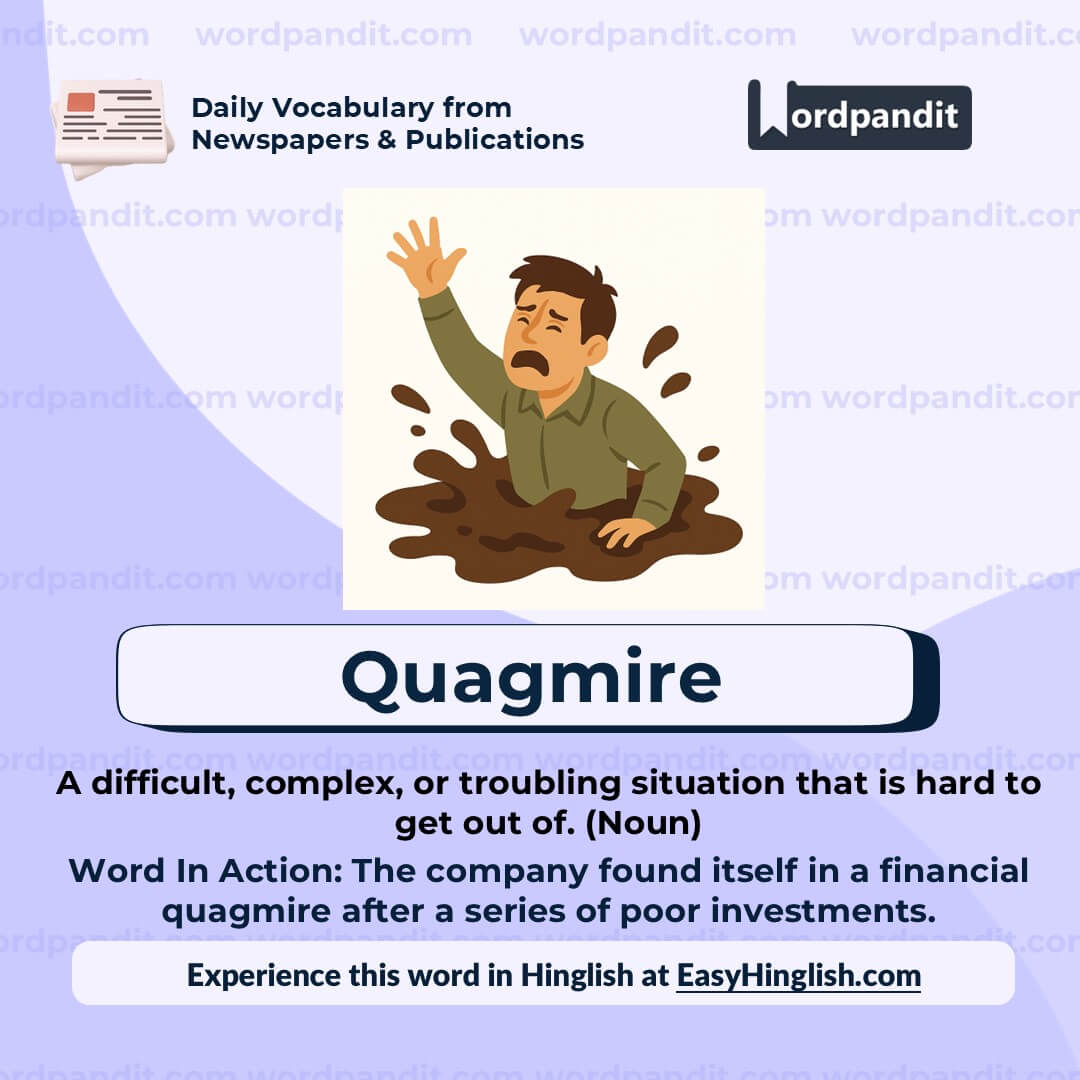Daily Vocabulary from Indian Newspapers and Publications
Welcome to Wordpandit’s Indian Vocabulary Hub
At Wordpandit, we understand the importance of staying rooted in the local context while expanding your language skills. This section focuses on enriching your vocabulary with words and phrases drawn from India’s leading newspapers and publications, ensuring you're learning vocabulary that is practical, relevant, and uniquely Indian.
Why Indian Sources Matter
We believe that the best way to master any language is by immersing yourself in local content. That’s why we carefully curate vocabulary from top Indian publications, including:
- The Hindu
- The Times of India
- The Economic Times
- Hindustan Times
- Live Mint
- The Indian Express
- And many others...
Stay Updated, Stay Relevant
With daily updates from Indian news sources, you’ll be consistently learning words that reflect the trends and shifts in Indian society and culture. Our focus is to provide vocabulary that enhances your understanding of the language in an Indian context.
How Wordpandit Supports Your Goals
Whether you’re preparing for exams, aiming to improve your professional communication, or simply want to stay connected with the latest Indian vocabulary, Wordpandit is here to guide you every step of the way.
Learn with a Practical Approach
Our interactive learning methodology includes real-world examples, engaging activities, and context-specific usage to ensure that every word becomes part of your active vocabulary.
Dive into Indian Vocabulary Today!
Why Choose Wordpandit?
Practical Learning: Focus on words you'll actually encounter in real-world reading, enhancing your comprehension and communication skills.
Diverse Content: From current affairs to scientific breakthroughs, our varied sources expose you to vocabulary across multiple domains.
Effortless Integration: Make Wordpandit a part of your daily routine. Just a few minutes each day can significantly boost your lexicon over time.
Your Path to Vocabulary Mastery
- Visit our Daily Vocabulary section regularly
- Explore new words and their usage in context
- Practice incorporating these words into your own writing and speech
- Track your progress as your vocabulary expands
Start Your Journey Today
Embark on your vocabulary enhancement journey with Wordpandit. By consistently engaging with our daily posts, you'll build a robust vocabulary that serves you well in academic, professional, and personal contexts.
Remember, a word a day keeps linguistic limitations at bay. Make Wordpandit your daily companion in the quest for vocabulary excellence!
WORD-1: Inveterate
Context:
"An inveterate critic of government policy, she has consistently advocated for greater transparency in public institutions." - The Print
Explanatory Paragraph:
The word "inveterate" describes someone who has a long-standing and firmly established habit, activity, or feeling — often used with a negative connotation. If someone is an "inveterate critic," it means they have been persistently and deeply critical over a long time. The term emphasizes the deep-rooted and habitual nature of a behavior.
Meaning: Having a particular habit or interest that is long-established and unlikely to change (Adjective)
Pronunciation: in-VEH-tuh-ruht
Difficulty Level: ⭐⭐⭐ Intermediate
Etymology: From Latin *inveteratus*, past participle of *inveterare* meaning "to grow old, to become established by age."
Prashant Sir's Notes:
Use this word when you want to describe someone who has a deep-rooted habit or characteristic, especially one that is unlikely to change. Common collocations: "inveterate liar," "inveterate gambler," "inveterate critic."
Synonyms & Antonyms:
Synonyms: chronic, habitual, entrenched, deep-rooted, confirmed
Antonyms: occasional, sporadic, temporary, fleeting
Usage Examples:
- He's an inveterate coffee drinker who can’t start his day without three cups.
- The journalist was known as an inveterate truth-seeker, never compromising on facts.
- Despite multiple warnings, she remained an inveterate rule-breaker.
- His inveterate pessimism made it hard for him to see the positives in any situation.
Cultural Reference:
"Mark Twain was an inveterate satirist, always ready to skewer societal norms with wit and sarcasm." - Literary Biographies
Think About It:
Can being an inveterate critic of something lead to positive change, or does it risk turning into unproductive negativity?
Quick Activity:
Write a short paragraph about someone you know (real or fictional) using the word “inveterate” accurately. Try to show the depth and consistency of the behavior you're describing.
Memory Tip:
Think of "in-VETERAN" — like a veteran habit that’s been around forever. "Inveterate" is a veteran of bad (or deep-rooted) habits!
Real-World Application:
The word "inveterate" is especially useful in essays, op-eds, and critiques where you want to emphasize the long-standing nature of a habit, belief, or characteristic — especially in political, behavioral, or psychological discussions.
WORD-2: Propensity
Context:
"The study reveals a propensity among urban youth to delay marriage and prioritize career development." - National Herald
Explanatory Paragraph:
"Propensity" refers to a natural tendency or inclination to behave in a particular way. It often suggests that someone is likely to act in a certain manner due to internal preferences or patterns. For example, if someone has a propensity to procrastinate, it means they’re naturally inclined to delay tasks. In the given context, the word highlights a growing pattern among young people in cities — they are increasingly choosing to focus on their careers before settling down.
Meaning: A natural inclination or tendency to behave in a particular way (Noun)
Pronunciation: pruh-PEN-sih-tee
Difficulty Level: ⭐⭐ Upper Beginner
Etymology: From Latin *propensus*, meaning "inclined," from *propendere*, "to hang forward or be inclined."
Prashant Sir's Notes:
“Propensity” is great for formal and academic writing. Use it when describing patterns or habits that come naturally to someone. Tip: pair it with "for" or "to" — e.g., "propensity for violence," "propensity to save money."
Synonyms & Antonyms:
Synonyms: inclination, tendency, predisposition, leaning, proclivity
Antonyms: disinclination, aversion, unwillingness, resistance
Usage Examples:
- He has a propensity to overthink even the simplest decisions.
- Children often show a natural propensity for creativity when given freedom.
- The company has a troubling propensity for ignoring safety protocols.
- Her propensity to help others makes her a beloved figure in the community.
Cultural Reference:
"Humans have a remarkable propensity to adapt in times of crisis." - From a TED Talk on Human Resilience
Think About It:
Are our propensities shaped more by nature (genetics) or nurture (environment)? What do you think drives your own habits?
Quick Activity:
List three of your own propensities. Are they helpful or harmful in your daily life? Write one sentence for each using the word correctly.
Memory Tip:
Think: “Pro” = forward, and “pensity” = tendency — so “propensity” is a tendency leaning forward toward something!
Real-World Application:
“Propensity” is frequently used in psychology, sociology, and economics to describe behavioral patterns — such as a consumer's propensity to buy, or a student's propensity to learn through visual aids.
WORD-3: Quagmire
Context:
"The infrastructure project has become a financial quagmire, with costs spiraling and deadlines repeatedly pushed back." - Financial Express
Explanatory Paragraph:
"Quagmire" literally refers to a soft, muddy area of land that gives way underfoot — like a swamp. Metaphorically, it describes any complex, messy, or difficult situation that is hard to escape or resolve. In this context, the term is used to show how the infrastructure project has sunk into a confusing and costly mess, with no easy solution in sight. The word evokes the feeling of being stuck and unable to move forward.
Meaning: A complicated, troublesome, or awkward situation that is difficult to escape from (Noun)
Pronunciation: KWAG-my-er
Difficulty Level: ⭐⭐⭐ Intermediate
Etymology: From obsolete English *quag* (a marsh) + *mire* (a bog), originally referring to boggy ground.
Prashant Sir's Notes:
Use “quagmire” when you want to express being stuck in a situation that’s hard to fix. It’s a strong, vivid word — especially good for politics, economics, or personal dilemmas. Common collocations: “political quagmire,” “legal quagmire,” “emotional quagmire.”
Synonyms & Antonyms:
Synonyms: mess, dilemma, entanglement, muddle, predicament
Antonyms: solution, clarity, breakthrough, resolution
Usage Examples:
- After years of indecision, the project sank into a bureaucratic quagmire.
- He found himself in a moral quagmire, unsure of what the right decision was.
- The military intervention turned into a political quagmire for the government.
- Her finances became a quagmire after taking on too many loans.
Cultural Reference:
"Vietnam was a quagmire." – This phrase became popular in American discourse to describe the complex, prolonged involvement of the U.S. in the Vietnam War, symbolizing a situation that seemed impossible to exit cleanly.
Think About It:
What’s a real-life situation (personal, national, or global) that could be described as a “quagmire”? Why do such situations tend to escalate?
Quick Activity:
Write two metaphors using “quagmire” — one for a personal challenge and one for a political or social issue. Example: “The group project turned into a quagmire of miscommunication.”
Memory Tip:
Think: “Quag” (swamp) + “mire” (mud) = You’re stuck! A quagmire traps your feet — or your progress.
Real-World Application:
"Quagmire" is widely used in journalism, politics, and law to describe complicated and frustrating scenarios — such as drawn-out legal battles, war zones, or failed policy reforms.
WORD-4: Anathema
Context:
"The proposal to commercialize sacred forests is anathema to indigenous communities who consider these spaces integral to their cultural identity." - Down To Earth
Explanatory Paragraph:
“Anathema” refers to something or someone that is strongly disliked, rejected, or even cursed. It often carries a sense of moral or emotional opposition. In the given sentence, the word highlights how deeply offensive and unacceptable the commercialization of sacred land is to indigenous people — not just as a policy disagreement, but as something fundamentally wrong and alien to their values.
Meaning: Something or someone intensely disliked or loathed; a formal curse by a religious authority (Noun)
Pronunciation: uh-NA-thuh-muh
Difficulty Level: ⭐⭐⭐⭐ Advanced
Etymology: From Greek *anathema*, meaning "a thing devoted (to evil), a curse," originally meaning "an offering" but later evolving to denote something accursed or banned.
Prashant Sir's Notes:
Use “anathema” when a person or group feels that something is fundamentally unacceptable or offensive — often in moral, cultural, or religious contexts. Common phrases: “X is anathema to Y.” It’s powerful, formal, and not used for trivial dislikes.
Synonyms & Antonyms:
Synonyms: abomination, outrage, disgrace, pariah, detested thing
Antonyms: ideal, favorite, beloved, blessing, acceptance
Usage Examples:
- The idea of cheating on an exam is anathema to her strong sense of integrity.
- For environmentalists, drilling in protected areas is absolute anathema.
- To a minimalist, cluttered spaces are anathema.
- Corruption in public office is anathema to democratic values.
Cultural Reference:
In the early Christian Church, a person declared heretical could be labeled “anathema,” meaning they were excommunicated and spiritually condemned — an example of the word’s intense original use.
Think About It:
What modern-day social or political ideas might be considered “anathema” to different communities or belief systems? How does this shape public discourse?
Quick Activity:
Choose a value you strongly believe in. Then write a sentence using “anathema” to describe something that goes against that value.
Memory Tip:
“Anathema” sounds like “a-NO-theme-uh” — think of it as something that doesn’t fit your theme or values at all. It’s the opposite of what you stand for!
Real-World Application:
This word is useful in academic essays, debates, and journalism when describing moral, cultural, or ideological opposition. It adds force and seriousness to a statement of disapproval.
WORD-5: Expeditious
Context:
"The Chief Justice called for expeditious resolution of pending cases, noting that delayed justice undermines public faith in the judicial system." - Legal India
Explanatory Paragraph:
"Expeditious" refers to something done quickly and efficiently, especially when speed is necessary without sacrificing quality. It’s often used in formal or professional settings, such as legal, administrative, or governmental contexts. In the sentence above, the Chief Justice is urging the legal system to process and resolve cases swiftly, so justice is not delayed, which in turn would maintain the public's trust in the courts.
Meaning: Done with speed and efficiency (Adjective)
Pronunciation: ek-spuh-DIH-shuhs
Difficulty Level: ⭐⭐ Upper Beginner
Etymology: From Latin *expeditus* meaning "unimpeded, prompt," from *expedire* meaning "to free, disengage, set in order."
Prashant Sir's Notes:
This is a great word to use in formal writing or speech when you want to emphasize efficiency and urgency. Common collocations include: “expeditious action,” “expeditious process,” and “expeditious handling.” Especially important in contexts like governance, administration, and law.
Synonyms & Antonyms:
Synonyms: prompt, swift, efficient, speedy, brisk
Antonyms: slow, delayed, sluggish, prolonged, inefficient
Usage Examples:
- The team ensured expeditious delivery of aid to flood-hit areas.
- An expeditious investigation prevented the situation from escalating further.
- We need an expeditious approach to tackle the growing backlog of applications.
- Expeditious communication between departments helped resolve the issue in record time.
Cultural Reference:
In legal and governmental reforms worldwide, leaders often stress the need for "expeditious justice" — a concept rooted in the idea that "justice delayed is justice denied."
Think About It:
In which areas of life — personal or professional — would an expeditious approach be more beneficial than a careful, deliberate one? Where might it be harmful?
Quick Activity:
Think of a task you often delay. Now, rewrite your approach using “expeditious” as the goal — describe how you would complete it swiftly and efficiently.
Memory Tip:
“Expeditious” sounds like “express delivery” — fast and efficient! Use that to remember its meaning.
Real-World Application:
This word is frequently used in corporate emails, legal rulings, and government communication when emphasizing the importance of timely and efficient action — without getting bogged down by delays.



















